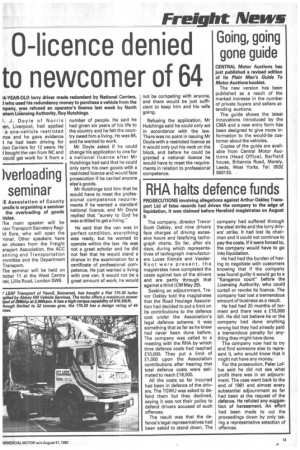RHA halts defence funds
Page 7

If you've noticed an error in this article please click here to report it so we can fix it.
PROSECUTIONS involving allegations against Arthur Oakley Transport Ltd of false records had driven the company to the edge of liquidation, it was claimed before Hereford magistrates on August 9.
The company, director Trevor Scott Oakley, and nine drivers face charges of driving excessive hours and falsifying tachograph charts. So far, after six days, during which representatives of tachograph manufacturers Lucas Kienzle and VeederRoot were present, the magistrates have completed the cases against two of the drivers and are partly through that against a third (CM May 29).
Seeking an adjournment, Trevor Oakley told the magistrates that the Road Haulage Association had decided to put a limit on its contributions to the defence cost under the Association's legal defence scheme. It was something that as far as he knew had never been done before. The company was called to a meeting with the RHA by which time defence costs had reached £10,000. They put a limit of £1,000 upon the Association contributions after hearing that total defence costs were estimated to reach £18,000.
All the costs so far incurred had been in defence of the drivers. The TGWU was asked to defend them but they declined, saying it was not their policy to defend drivers accused of such offences.
The result was that the defence's legal representatives had been asked to stand down. The
company had suffered through the steel strike and the lorry drivers' strike. It had lost its chairman and it could not continue to pay the costs. If it were forced to, the company would have to go into liquidation.
He had had the burden of having to negotiate with customers knowing that if the company was found guilty it would go to a "Kangaroo court" before the Licensing Authority, who could curtail or revoke its licence. The company had lost a tremendous amount of business as a result.
He had had 20 months of torment and there was a £10,000 bill. He did not believe he or the company had done anything wrong but they had already paid a tremendous penalty for anything they might have done.
The company now had to try and find someone else to represent it, who would know that it might not have any money.
For the prosecution, Peter Loftus said he did not see what profit there was in an adjournment. The case went back to the end of 1981 and almost every substantial adjournment so far had been at the request of the defence. He refuted any suggestion of harassment. An effort had been made to cut the proceedings down by only taking a representative selection of offences.










































